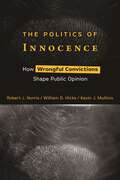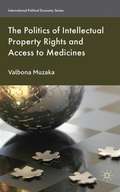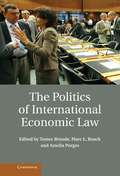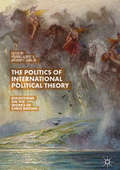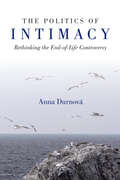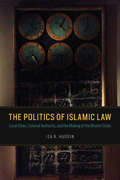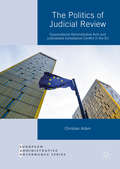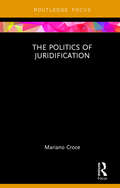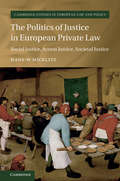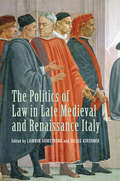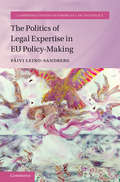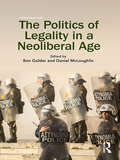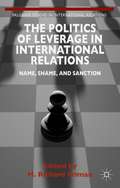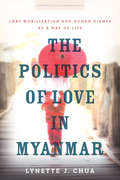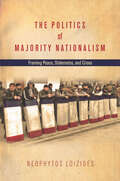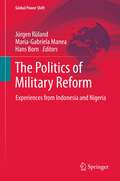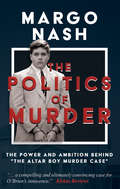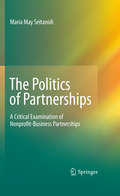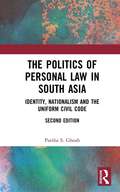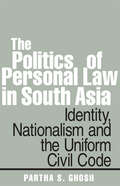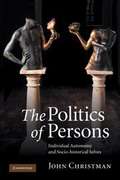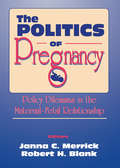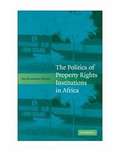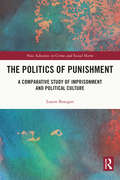- Table View
- List View
The Politics of Innocence: How Wrongful Convictions Shape Public Opinion
by Robert J. Norris William D. Hicks Kevin J. Mullinix2024 Outstanding Academic Title, given by Choice ReviewsThe political dynamics that shape the Innocence MovementSince 1989, more than 3000 people are known to have been exonerated after being wrongly convicted in the United States. Each one of these cases represents a gross miscarriage of justice; they are stories of lives upended by a criminal legal system gone awry. Yet, this number just scratches the surface and does not capture the full breadth of wrongful convictions, which may well number in the tens of thousands.The Politics of Innocence explores the political dynamics that have shaped the proliferation of innocence-related policies across the United States and the ways in which wrongful convictions affect public opinion about the criminal legal system. Although some have suggested that this issue transcends ideological divisions, the authors argue that public opinion and the policies that address wrongful convictions are a product of the political landscape. Using original data, the authors show how political ideology influences awareness of the issue, affects support for policy reform, and, in particular electoral contexts, influences state policy adoption. The Politics of Innocence is a moving and data-driven account of wrongful convictions.
The Politics of Intellectual Property Rights and Access to Medicines
by Valbona MuzakaThis book shows why contests over intellectual property rights and access to affordable medicines emerged in the 1990s and how they have been 'resolved' so far. It argues that the current arrangement mainly ensures wealth for some rather than health for all, and points to broader concerns related to governing intellectual property solely as capital
The Politics of International Economic Law
by Tomer Broude Marc L. Busch Amelia PorgesHow do politics and international economic law interact with each other? Financial crises and shifts in global economic patterns have refocused our attention on how the fingerprints of the 'visible hand' can be seen all over the institutions that underpin the rules of globalization. From trade and investment to finance, governments are under pressure to enforce, resist and rewrite international economic law. Lawyers have seldom given enough attention to the influence of politics on law, whereas political scientists have had an on-again, off-again fascination with how the law influences relations among states. This book leads the way toward filling this interdisciplinary gap, through a series of important studies written by leaders in the field on specific problems in international economic relations. The book demonstrates a variety of ways in which the international political-economic nexus may be researched and understood.
The Politics of International Political Theory: Reflections On The Works Of Chris Brown
by Mathias Albert Anthony F. Lang Jr.This book assesses the impact of the work of Chris Brown in the field of International Political Theory. The volume engages with general issues of IPT as well as basic issues such as the use and role of practical reasoning and presents a nuanced understanding about issues regarding the legitimacy of war and violence. It explores questions that pertain to human rights, morality, and ethics, and generally an outlook for devising a ‘better’ world. The project is ideal for audiences with interest in International Relations, Ethics and Morality Studies and International Political Theory.
The Politics of Intimacy: Rethinking the End-of-Life Controversy (Configurations: Critical Studies Of World Politics)
by Anna DurnováDebates on the end-of-life controversy are complex because they seem to highjack national and cultural traditions. Where previous books have focused on ideological grounds, The Politics of Intimacy explores dying as the site where policies are negotiated and implemented. Intimacy comprises the emotional experience of the end of life and how we acknowledge it—or not—through institutions. This process shows that end-of-life controversy relies on the conflict between the individual and these institutions, a relationship that is the cornerstone of Western liberal democracies. <P><P> Through interviews with mourners, stakeholders, and medical professionals, examination of media debates in France and the Czech Republic, Durnová shows that liberal institutions, in their attempts to accommodate the emotional experience at the end of life, ultimately fail. She describes this deadlock as the “politics of intimacy,” revealing that political institutions deploy power through collective acknowledgment of individual emotions but fail to maintain this recognition because of this same experience.
The Politics of Islamic Law: Local Elites, Colonial Authority, and the Making of the Muslim State
by Iza R. HussinIn The Politics of Islamic Law, Iza Hussin compares India, Malaya, and Egypt during the British colonial period in order to trace the making and transformation of the contemporary category of ‘Islamic law.’ She demonstrates that not only is Islamic law not the shari’ah, its present institutional forms, substantive content, symbolic vocabulary, and relationship to state and society—in short, its politics—are built upon foundations laid during the colonial encounter. Drawing on extensive archival work in English, Arabic, and Malay—from court records to colonial and local papers to private letters and visual material—Hussin offers a view of politics in the colonial period as an iterative series of negotiations between local and colonial powers in multiple locations. She shows how this resulted in a paradox, centralizing Islamic law at the same time that it limited its reach to family and ritual matters, and produced a transformation in the Muslim state, providing the frame within which Islam is articulated today, setting the agenda for ongoing legislation and policy, and defining the limits of change. Combining a genealogy of law with a political analysis of its institutional dynamics, this book offers an up-close look at the ways in which global transformations are realized at the local level.
The Politics of Juridification: The Actor's Revenge (Law and Politics)
by Mariano CroceThe Politics of Juridification offers a timely contribution to debates about how politics is being affected by the increasing relevance of judicial bodies to the daily administration of Western political communities. While most critical analyses portray juridification as a depoliticizing, de-democratizing transferral of political authority to the courts (whether national or international), this book centres on the workable ambivalence of such a far-reaching phenomenon. While juridification certainly intensifies the power and competences of judicial bodies to the disadvantage of representative political institutions, it cannot be easily reduced to the demise of democratic politics. By focusing on the multiple ways in which social agents make use of the law, The Politics of Juridification teases out the agential and transformative aspects of the various negotiations social agents engage with legal institutions with a view to obtaining political visibility. In particular, the book homes in on two seemingly distinct phenomena: on one hand, the regulation of sexuality and emerging kinship formations; on the other, the fragmentation of legal settings due to the claims to legal autonomy advanced by sub-state cultural and religious groups. By doing so, the book makes the case for an unexpected convergence between the struggles for legal recognition of sexual minorities and religious and cultural minorities. The conclusion is that juridification does entail normalization and favour the infiltration of law into the social realm. But because of its ambivalent nature, it can and does serve as an alternative vehicle for social change – one that attaches more importance to how social agents produce law on a daily basis and how this law permeates official legal orders.
The Politics of Justice in European Private Law: Social Justice, Access Justice, Societal Justice (Cambridge Studies in European Law and Policy)
by Hans-W MicklitzThe Politics of Justice in European Private Law intends to highlight the differences between the Member States' concepts of social justice, which have developed historically, and the distinct European concept of access justice. Contrary to the emerging critique of Europe's justice deficit in the aftermath of the Euro crisis, this book argues that beneath the larger picture of the Monetary Union, a more positive and more promising European concept of justice is developing. European access justice is thinner than national social justice, but access justice represents a distinct conception of justice nevertheless. Member States or nation states remain free to complement European access justice and bring to bear their own pattern of social justice.
The Politics of Law in Late Medieval and Renaissance Italy
by Julius Kirshner Lauro Martines Lawrin ArmstrongThe Politics of Law in Late Medieval and Renaissance Italy features original contributions by international scholars on the fortieth anniversary of the publication of Lauro Martines' Lawyers and Statecraft in Renaissance Florence, which is recognized as a groundbreaking study challenging traditional approaches to both Florentine and legal history.Essays by leading historians examine the professional, social, and political functions of Italian jurists from the thirteenth to the late fifteenth centuries. The volume also examines the use of emergency powers, the critical role played by jurists in mediating the rule of law, and the adjudication of political crimes. The Politics of Law in Late Medieval and Renaissance Italy provides both an assessment of Martines' pioneering archival scholarship as well as fresh insights into the interplay of law and politics in late medieval and Renaissance Italy.
The Politics of Legal Expertise in EU Policy-Making (Cambridge Studies in European Law and Policy)
by Päivi Leino-SandbergLegal advisers working in the institutions of the European Union exercise significant power, but very little is known about their work. Notwithstanding the handful of cases where legal matters find their way into the news, legal advice remains invisible in EU policy making. For more than ten years Päivi Leino-Sandberg was a part of the invisible community of EU legal advisers, and participated in the exercise of their power. In this book, she shares her insights about how law and lawyers work in the EU institutions, and what their role and impact is on EU decisions from within the decision-making structure. She draws on interviews with over sixty EU lawyers and policymakers: legal experts who interpret the Treaties within the Institutions, draft legislation and defend the Institutions before the EU Court. Telling the true stories behind key negotiations, this book explores the interplay and tensions between legal requirements and political ambitions.
The Politics of Legality in a Neoliberal Age
by Ben Golder Daniel McLoughlinThis volume addresses the relationship between law and neoliberalism. Assembling work from established and emerging legal scholars, political theorists, philosophers, historians, and sociologists from around the world – including the Americas, Australia, Europe, and the United Kingdom – it addresses the conceptual, legal, and political relationships between liberal legality and neoliberal economics. More specifically, the book analyses the role that legality plays in the dominant economic force of our time, offering both a legal corrective to scholarship in economics and political economy that has paid insufficient attention to legal ideas, and, at the same time, a political economic corrective to legal scholarship that has only recently turned to theorizing neoliberalism. It will be of enormous interest to those working at the intersection of law and politics in our neoliberal age.
The Politics of Leverage in International Relations
by H. Richard FrimanThis unique volume unpacks the concept and practice of naming and shaming by examining how governments, NGOs and international organisations attempt to change the behaviour of targeted actors through public exposure of violations of normative standards and legal commitments.
The Politics of Love in Myanmar: LGBT Mobilization and Human Rights as a Way of Life (Stanford Studies in Human Rights)
by Lynette J. ChuaThe Politics of Love in Myanmar offers an intimate ethnographic account of a group of LGBT activists before, during, and after Myanmar's post-2011 political transition. Lynette J. Chua explores how these activists devoted themselves to, and fell in love with, the practice of human rights and how they were able to empower queer Burmese to accept themselves, gain social belonging, and reform discriminatory legislation and law enforcement. Informed by interviews with activists from all walks of life—city dwellers, villagers, political dissidents, children of military families, wage laborers, shopkeepers, beauticians, spirit mediums, lawyers, students—Chua details the vivid particulars of the LGBT activist experience founding a movement first among exiles and migrants and then in Myanmar's cities, towns, and countryside. A distinct political and emotional culture of activism took shape, fusing shared emotions and cultural bearings with legal and political ideas about human rights. For this network of activists, human rights moved hearts and minds and crafted a transformative web of friendship, fellowship, and affection among queer Burmese. Chua's investigation provides crucial insights into the intersection of emotions and interpersonal relationships with law, rights, and social movements.
The Politics of Majority Nationalism: Framing Peace, Stalemates, and Crises
by Neophytos LoizidesWhat drives the politics of majority nationalism during crises, stalemates and peace mediations? In his innovative study of majority nationalism, Neophytos Loizides answers this important question by investigating how peacemakers succeed or fail in transforming the language of ethnic nationalism and war. The Politics of Majority Nationalism focuses on the contemporary politics of the 'post-Ottoman neighborhood' to explore conflict management in Greece and Turkey while extending its arguments to Serbia, Georgia and Ukraine. Drawing on systematic coding of parliamentary debates, new datasets and elite interviews, the book analyses and explains the under-emphasized linkages between institutions, symbols, and framing processes that enable or restrict the choice of peace. Emphasizing the constraints societies face when trapped in antagonistic frames, Loizides argues wisely mediated institutional arrangements can allow peacemaking to progress.
The Politics of Military Reform
by Hans Born Jürgen Rüland Maria-Gabriela ManeaThis volume seeks to explain why democratization and military reforms stagnate in newly democratizing countries. The contributions blend historical, ideational, cultural and structural explanatory factors to analyze the trajectories of military reform in Indonesia and Nigeria, two major regional powers that share many structural commonalities. In the tradition of the literature on security sector reform (SSR), the book not only scrutinizes executive initiatives toward military reform, but also provides ample coverage of societal actors. Findings show that while military reform is stagnating in both countries, societal forces ought to be taken into account more as major driving forces in explaining military reform. Several chapters study how legislatures, non-governmental organizations and the civilian defence epistemic community contribute to the transformation of military institutions. The last part of the book tackles another aspect rarely studied in the literature on military reform, namely, the role of militias in military reform.
The Politics of Murder: The Power and Ambition Behind "The Altar Boy Murder Case"
by Margo NashThis true crime investigation of a Boston teenager&’s murder trial is &“a chilling story about corruption, political power and a stacked judicial system" (John Ferak, author of Failure of Justice). On a hot night in July 1995, Janet Downing was stabbed ninety-eight times in her Somerville home, two miles northwest of Boston. Within hours, fifteen-year-old Eddie O&’Brien was identified as the prime suspect. The best friend of one of Janet&’s sons, Eddie was a peculiar choice. He had no criminal record or symptoms of mental illness. He had neither motive nor opportunity to commit the crime—while others had both. And yet, powers far beyond Somerville decided that Eddie was guilty. Perhaps it was politics. At the time, a movement targeting the supposed scourge of young &“superpredators&” was sweeping the nation. Dubbed the alter boy murder case by Court TV, Eddie&’s trial garnered national publicity and changed juvenile law in Massachusetts. But, as attorney Margo Nash demonstrates in this explosive expose, the justice system failed Eddie. Appointed Eddie&’s guardian ad litem, Nash attended every court session and gained access to his files. Examining the investigation, trial transcripts, and forensic evidence, Nash demonstrates that Eddie could not have committed the crime and that other viable suspects were never properly considered. Now readers can decide if politics sent an innocent boy to adult prison for the rest of his life.
The Politics of Partnerships: A Critical Examination of Nonprofit-Business Partnerships
by Maria May SeitanidiThe widespread partnering phenomenon in the US and the UK spurred a significant amount of literature focusing on its strategic use. The Politics of Partnerships diverges by examining if partnerships can deliver benefits that extend beyond the organisational to the societal level resulting from the intentional combined efforts of the partners.
The Politics of Personal Law in South Asia: Identity, Nationalism and the Uniform Civil Code
by Partha S. GhoshThe viability of the Uniform Civil Code (UCC) has always been a bone of contention in socially and politically plural South Asia. It is entangled within the polemics of identity politics, minority rights, women’s rights, national integration, uniform citizenry and, of late, global Islamic politics and universal human rights. While champions of each category view the issue from their own perspectives, making the debate extremely complex, this book takes up the challenge of providing a holistic political analysis. As most of the South Asian states today subscribe to a decentralised view and share a common history, this study is an excellent comparative analysis of the applicability of the UCC. In this work, India figures prominently, being the most plural and vibrant democracy, as well as accounting for almost three-fourths of the region’s population. This provides the backdrop for an analysis of the other states in the region. This second edition will be indispensable for scholars, researchers and students of law, political science and South Asian Studies.
The Politics of Personal Law in South Asia: Identity, Nationalism and the Uniform Civil Code
by Partha S. GhoshIt is a political study of the controversy surrounding the issue of the uniform civil code vis-à-vis personal laws from a South Asian perspective. At the centre of the debate is whether there should be a centralized view of the legal system in a given society or a decentralized view, both horizontally and vertically. This issue is entangled within the threads of identity politics, minority rights, women’s rights, national integration, global Islamic politics and universal human rights. Champions of each category view it through their own prisms, making the debate extremely complex, especially in politically and socially plural South Asia. So, this book attempts to harmonize the threads of the debate to provide a holistic political analysis.
The Politics of Persons: Individual Autonomy and Socio-historical Selves
by John ChristmanIt is both an ideal and an assumption of traditional conceptions of justice for liberal democracies that citizens are autonomous, self-governing persons. Yet standard accounts of the self and of self-government at work in such theories are hotly disputed and often roundly criticized in most of their guises. John Christman offers a sustained critical analysis of both the idea of the 'self' and of autonomy as these ideas function in political theory, offering interpretations of these ideas which avoid such disputes and withstand such criticisms. Christman's model of individual autonomy takes into account the socially constructed nature of persons and their complex cultural and social identities, and he shows how this model can provide a foundation for principles of justice for complex democracies marked by radical difference among citizens. His book will interest a wide range of readers in philosophy, politics, and the social sciences.
The Politics of Pregnancy: Policy Dilemmas in the Maternal-Fetal Relationship
by Janna C MerrickHere is a comprehensive overview and analysis of issues concerning the maternal-fetal relationship, from abortion to surrogate motherhood. Unlike many books which cover reproductive issues in general, this book focuses in-depth on one aspect of reproduction--the maternal-fetal relationship--to give readers a detailed study of the many issues involved. The Politics of Pregnancy discusses public policy dimensions of this relationship and posits new, critical political dilemmas. Many chapters in this unique book also provide significant clinical information as well as conceptual analysis.The Politics of Pregnancy offers great diversity in terms of the disciplinary backgrounds of the authors and their ideological perspectives. Authors come from many fields, including sociology, political science, pediatrics, ethics, and psychiatry, and provide diverse, sometimes opposing, analytical positions. Some of the topics they debate include: maternal substance use during pregnancy prenatal technology pregnancy and workplace hazards court-ordered obstetrical intervention fetal experimentationReaders interested in public and health care policy, nursing, feminism, pediatrics, or ethics, will find The Politics of Pregnancy to be a stimulating and thought-provoking book. This volume also makes an excellent discussion tool for graduate courses in these areas.
The Politics of Principle
by Theunis RouxUnder its first chief justice, Arthur Chaskalson, the South African Constitutional Court built an unrivalled reputation in the comparative constitutional law community for technically accomplished and morally enlightened decision-making. At the same time, the Court proved remarkably effective in asserting its institutional role in post-apartheid politics. While each of these accomplishments is noteworthy in its own right, the Court's simultaneous success in legal and political terms demands separate investigation. Drawing on and synthesising various insights from judicial politics and legal theory, this study offers an interdisciplinary explanation for the Chaskalson Court's achievement. Rather than a purely political strategy of the kind modelled by rational choice theorists, the study argues that the Court's achievement is attributable to a series of adjudicative strategies in different areas of law. In combination, these strategies allowed the Court to satisfy institutional norms of public reason-giving while at the same time avoiding political attack.
The Politics of Property Rights Institutions in Africa
by Ato Kwamena OnomaWhy do some political leaders create and strengthen institutions like title registries and land tribunals that secure property rights to land while others neglect these institutions or destroy those that already exist? How do these institutions evolve once they have been established? This book answers these questions through spatial and temporal comparison of national and subnational cases from Botswana, Ghana, and Kenya and, to a lesser extent, Zimbabwe. Onoma argues that the level of property rights security that leaders prefer depends on how they use land. However, the extent to which leaders' institutional preferences are translated into actual institutions depends on the level of leaders' capacity. Further, once established, these institutions through their very working can contribute to their own decline over time. This book is unique in revealing the political and economic reasons why some leaders unlike others prefer an environment of insecure rights even as land prices increase.
The Politics of Punishment: A Comparative Study of Imprisonment and Political Culture (New Advances in Crime and Social Harm)
by Louise BranganPrisons are everywhere. Yet they are not everywhere alike. How can we explain the differences in cross-national uses of incarceration? The Politics of Punishment explores this question by undertaking a comparative sociological analysis of penal politics and imprisonment in Ireland and Scotland. Using archives and oral history, this book shows that divergences in the uses of imprisonment result from the distinctive features of a nation’s political culture: the different political ideas, cultural values and social anxieties that shape prison policymaking. Political culture thus connects large-scale social phenomena to actual carceral outcomes, illuminating the forces that support and perpetuate cross-national penal differences. The work therefore offers a new framework for the comparative study of penality. This is also an important work of sociology and history. By closely tracking how and why the politics of punishment evolved and adapted over time, we also yield rich and compelling new accounts of both Irish and Scottish penal cultures from 1970 to the 1990s. The Politics of Punishment will be essential reading for students and academics interested in the sociology of punishment, comparative penology, criminology, penal policymaking, law and social history.
